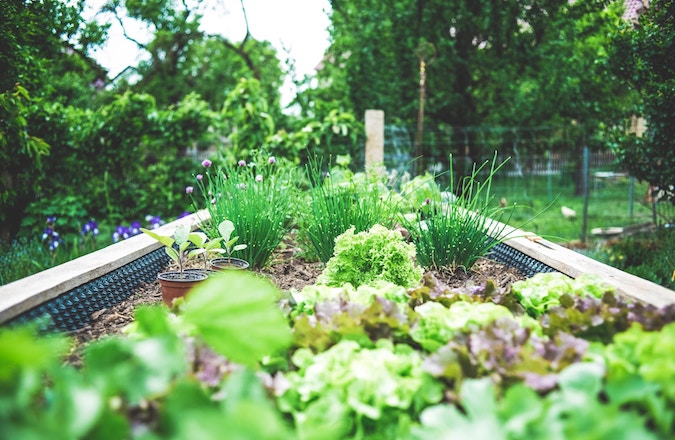Many gardeners and wildlife enthusiasts have probably noticed the impacts of climate change on their garden habitats. Whether the term gardening is just a few pots and herbs on the windowsill or growing your own fruit and vegetables on an allotment or in containers, gardening is one of the most popular hobbies in the world.
In the UK, over 7 million of us have taken up gardening since the pandemic [1], so it’s a good time to address the ways in which we can adapt our gardening styles to this change.
The Royal Horticultural Society (RHS) has stated that the basic rule for gardens to cope with climate change, is that they must become more resilient to hotter and drier conditions in the summer and more rainfall in the winter [2].
There are many ways of maintaining gardens to adapt to these conditions without harming the environment. Some of these include:
- Using solar powered outdoor lighting saves energy and costs.
- Installing a water butt and/or mulching helps retain moisture and water in the garden without wasting tap water.
- Planting more native species of plants and flowers that haven’t been overly bred to not have pollen for bees serves a greater purpose and can thrive [3].
- Protecting your garden from harsh sunlight and heat by planting trees, mulching, or using shade covers.
- Protecting your garden from frost and snow by moving plants in pots into a warmer or more sheltered part of the garden or into a cold greenhouse or cold frame.
Figure 1: Urban Gardening on Raised Bed, Gesees, Deutschland 2020 [10]
As water resources in the UK are under pressure from climate change and population growth. Gardeners should therefore use mains water as sparingly as they can. Fresh rainwater is the best type of water for plants so ensuring it’s kept in constant supply by installing a water butt is incredibly beneficial and saves on water costs. Tap water can contain chlorine, fluoride and other substances that can be harmful to plants and the ecosystem. Using sprinklers, hose pipes and watering cans filled up from the tap should be the last resort if rainwater is no longer in supply [4].
Another way of keeping your garden hydrated without using the mains supply, is by utilising a technique called mulching. This process uses loose coverings or sheets of material such as chopped leaves, straw, grass clippings, compost, wood chips, shredded bark, sawdust, pine needles and even paper, placed on the surface of the soil [5].
Depending on the type of mulch used, there are many different benefits of mulching including:
- Helps soil retain its moisture,
- Reduces watering,
- Suppresses weeds,
- Improves soil organic matter,
- Provides nutrients,
- Deters some pests,
- Warms up soil in spring,
- Protects plant roots from extreme hot and cold temperatures,
- Encourages beneficial soil organisms,
- Provides a barrier for edible crops meeting soil, and
- Gives a decorative finish.
Figure 2: Dried Grass in the Garden, 2022 [11]
With No Mow May inspiring people to let their gardens grow wild and become like a meadow, allowing your lawn to grow long is a good way of retaining moisture in the ground as the roots are longer and less vulnerable to the sun and the taller the grass the more ecosystems are able to thrive.
Temperature rises can rapidly dry the ground out, causing droughts which are often brought in during hot summers with little or no rain, lawns can turn brown and stop growing. Although it looks serious, the grass will green up once rain returns [6].
Creating a Low Maintenance Garden
Because not everyone can keep up with maintaining their garden all year round so will need to have a garden that requires minimum amounts of care, creating a low maintenance garden is key and all too often the most common answer to the problem of finding time, ability, or enthusiasm to maintain a garden, is to pave the whole thing over [7].
Reasons to need a low maintenance garden might include:
- When gardening at an older age
- When gardening with a disability
- When new to gardening
- When leading busy lives away from home
- When renting out a property with a garden
- When managing a garden in a holiday home
- When raising a family
- For non-gardeners who must look after a garden.
Thankfully, with some simple considerations, there are much better ways to manage a garden without becoming a slave to it.
For design and planning, a good place to start is looking at how much input you can make to the garden and the features or functions that are most important to you. Not everything need be lost. For example, if growing your own vegetables is high on the priority list, keep a veg patch that will meet your needs while minimising activity elsewhere such as replacing lawn with paving or a rose garden with a shrub border [7].
Also, positioning features that are more labour intensive closer to the house or the shed so there’s less effort required to walk, carry or barrow items up and down the garden. Installing a water point close to where it is most likely to be needed (e.g., a greenhouse) can also help. Equally, it may be that an automatic irrigation system [8], especially for lots of pots and planters, could take a lot of stress out of watering.
Although there is no such thing as a ‘no maintenance’ plant, there are many hardy evergreens that once established will require little care. Just ensure their expected mature height and spread isn’t too big for the space, otherwise pruning may be necessary.
Conclusion
Given that each person’s relationship with their gardens is so varied and unique, it’s also an industry that is expected to reach over £6.5 billion in 2025 [9], so choosing wisely how we adapt our gardens to climate change and our lifestyles is pivotal to the future of gardening.
About Pager Power
Pager Power undertakes technical assessments for developers of renewable energy projects and tall buildings worldwide. For more information about what we do, please get in touch.
References
[2] https://www.bbc.com/future/article/20220610-how-to-turn-your-garden-into-a-carbon-sink
[3] https://www.bbc.com/future/article/20230222-the-beautiful-flowers-that-bees-cant-use
[4] https://www.rhs.org.uk/garden-jobs/water-collecting-storing-and-using
[5] https://www.rhs.org.uk/soil-composts-mulches/mulch
[6] https://www.rhs.org.uk/lawns/drought-care
[7] https://www.rhs.org.uk/garden-design/low-maintenance-gardening
[9] https://horticulture.co.uk/gardening/statistics/
[10] Figure 1: Markus Spiske (June 2020) from Unsplash. Accessed on 7th July 2023. Available at: https://unsplash.com/photos/bk11wZwb9F4
[11] Figure 2: Engin Akyurt (February 2022) from Unsplash. Accessed on 7th July 2023. Available at: https://unsplash.com/photos/cQVpCGx4afs





